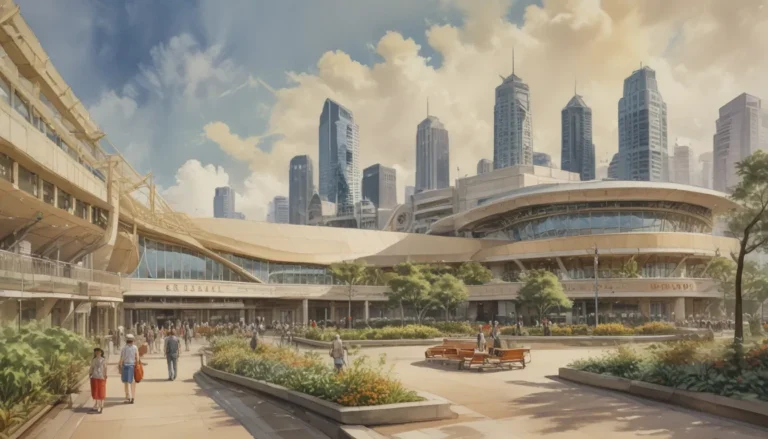The images in our articles are for illustrative purposes only and may not exactly match the content. They are intended to capture your interest and complement the text, not to replace it.
Maracanã Stadium, nestled in the vibrant city of Rio de Janeiro, Brazil, stands as a symbol of passion and love for the beautiful game of football. With a rich history and a legendary status, this iconic venue has witnessed historic sporting events and unforgettable moments that have captivated sports enthusiasts worldwide. Join us on a virtual journey as we unravel nine astounding facts about Maracanã that showcase its significance and impact on the sporting world.
Discover the Magnificence of Maracanã
Maracanã Stadium is a colossal arena with a seating capacity exceeding 78,000 spectators, making it one of the largest stadiums in the world. Its grandeur and iconic status have solidified its place as a significant landmark in the realm of sports, attracting fans from all corners of the globe.
A Historical Landmark: Host to World Cup Finals
The illustrious Maracanã has served as the backdrop for two monumental FIFA World Cup Finals. In 1950, the stadium witnessed the shocking defeat of Brazil by Uruguay in a historic match that resonates in football history. Additionally, the 2014 World Cup Final saw Germany emerge victorious against Argentina in another thrilling showdown at Maracanã.
Renovations for Grandeur: Preparing for the World Cup
In anticipation of the 2014 World Cup, Maracanã underwent extensive renovations to enhance its facilities and accommodate more spectators. These renovations introduced a new roof, upgraded amenities for visitors, and revamped infrastructure to meet the stringent standards set by FIFA.
A Versatile Venue: Beyond Football
While renowned for its football matches, Maracanã has also hosted a diverse range of events, including concerts, religious gatherings, and political rallies. The stadium’s versatility has attracted renowned artists and musicians, underscoring its status as a premier entertainment venue.
Setting Records: Witness to Unprecedented Attendance
Maracanã proudly holds the record for the highest attendance at a football match, with nearly 200,000 spectators filling the stands during the 1950 World Cup Final. This historic match between Brazil and Uruguay continues to reverberate through the annals of football history.
Home to Footballing Legends: A Revered Legacy
Maracanã has been graced by the presence of legendary footballers who have left an indelible mark on the sport. From Pelé and Zico to Ronaldo and Ronaldinho, the stadium has been a stage for extraordinary talent and unforgettable matches that have enthralled audiences.
Embracing Brazilian Culture: The Name Signifies Identity
The name “Maracanã” is rooted in the native Tupi-Guarani language, reflecting the stadium’s location. A fusion of “Mbara” meaning “large” and “Canã” meaning “similar to a canoe,” the name embodies the essence of the surrounding landscape.
Global Showcases: Olympic Celebrations at Maracanã
In 2016, Maracanã once again took center stage by hosting the Opening and Closing Ceremonies of the Olympic Games. The stadium became a platform for celebrating Brazil’s vibrant culture and spirit on a global scale.
Symbol of Passion: Love for Football
Maracanã transcends its role as a mere stadium and stands as a symbol of the profound passion Brazilians hold for football. The electrifying atmosphere during matches reflects the nation’s deep-rooted football culture and heritage.
Conclusion: A Marvel Unveiled
Maracanã Stadium stands as a testament to architectural grandeur, historical significance, and unforgettable experiences. Whether you are a dedicated football enthusiast or an admirer of remarkable landmarks, Maracanã beckons you to discover its magic. Join us in exploring the rich tapestry of football history, architectural brilliance, and vibrant atmosphere that make Maracanã a true wonder of the sporting world.
FAQs: Unveiling the Mysteries of Maracanã
- Inauguration Date: Maracanã Stadium was inaugurated on June 16, 1950.
- Seating Capacity: Maracanã Stadium can accommodate over 78,000 spectators.
- Home Clubs: Flamengo and Fluminense are the major football clubs that call Maracanã Stadium their home.
- World Cup Finals: Maracanã Stadium has hosted two FIFA World Cup finals in 1950 and 2014.
- Significance of Maracanazo: Maracanazo refers to Brazil’s shocking defeat by Uruguay in the 1950 World Cup Final.
- Guided Tours: Visitors can embark on guided tours of Maracanã Stadium to delve into its history and facilities.
- Accessibility: Maracanã Stadium offers accessible facilities for visitors with disabilities.
- Football Matches: Maracanã Stadium hosts various football matches, both local and international.
- Optimal Visit Time: The best time to visit Maracanã Stadium is during a live football match to experience its vibrant atmosphere.
Embark on a journey through the vibrant history and remarkable legacy of Maracanã Stadium, a place where football dreams are realized and legends are born. As you immerse yourself in the electrifying aura of this iconic venue, you’ll truly understand why Maracanã holds a special place in the hearts of sports enthusiasts worldwide. Dare to explore the wonders of Maracanã and unlock the secrets of its timeless allure!






